On Wednesdays at 12 p.m., Kyle Willans lingers at the coffee counter and chats with his co-workers. He is off work but unwilling to turn in his apron for the day.
Beside him patiently waits Diane Willans, his mom and his ride home.
“He’s done with his shifts,” Diane Willans said. “He’s been done since 11 (a.m.), but we’re usually here for another hour because he just likes to talk with his friends.”
Kyle Willans has autism. He is a drink maker at Bitty & Beau’s, a coffee shop in North Bethlehem which employs individuals with intellectual and developmental disabilities. Every employee at the store has a disability, with the exception of the supervisors and the managers.
He’s been working at the shop since its opening in November 2021.
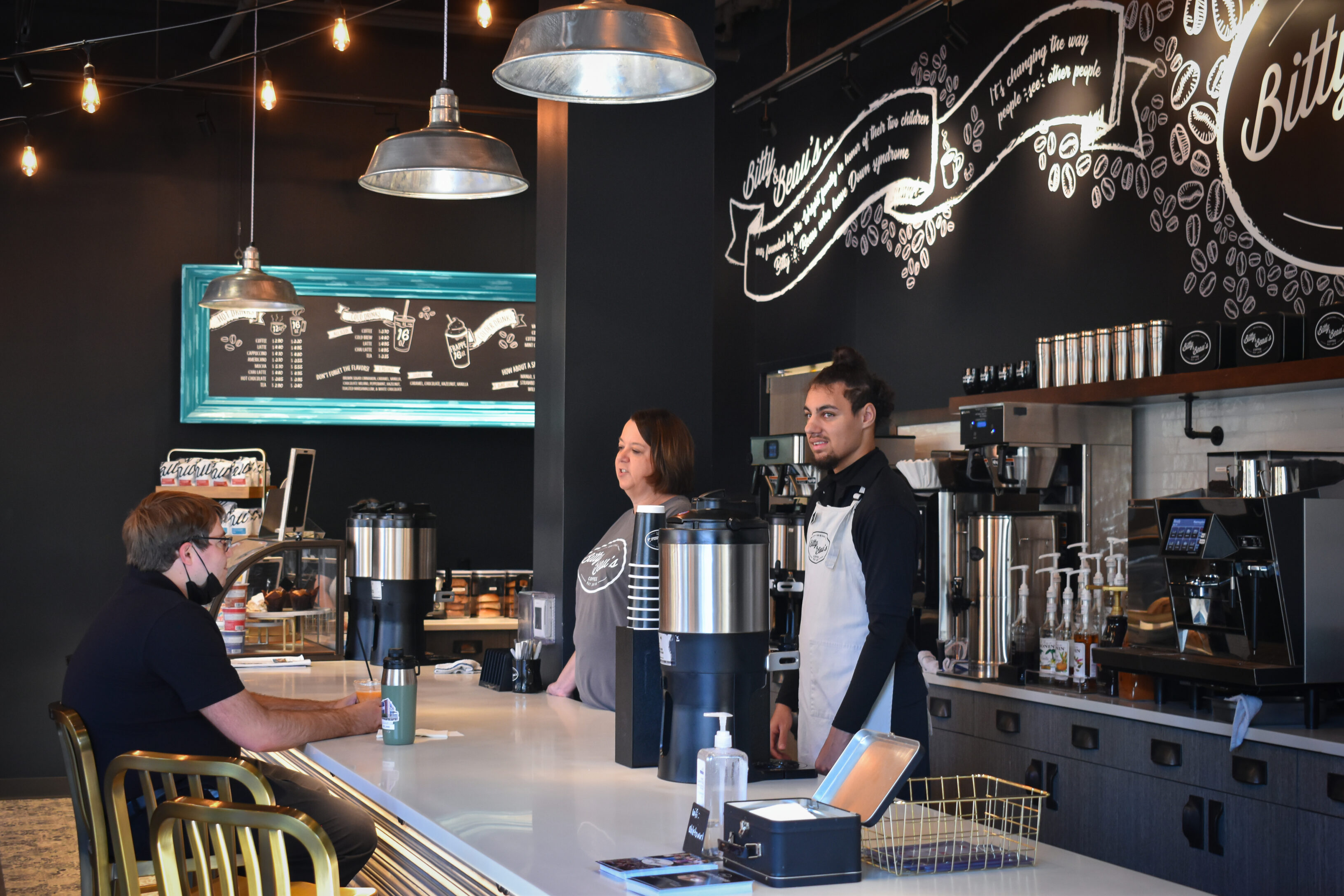
Kyle Willans talks with his co-workers after his shift is over while he drinks a smoothie. Each employee at the shop gets one free drink each day. (Sharon Jo/B&W Staff)
“He’s just really opened up and blossomed so much, and that’s been a wonderful experience,” Diane Willans said. “He’ll tell people all the time that he meets, or at a restaurant sitting next to us, ‘Come to Bitty and Beau’s.’”
Founder Amy Wright started the business with her husband in 2016 when she realized her two youngest children, who have Down syndrome, could face the same fate as the 80% of disabled individuals in America who are currently unemployed.
“We started thinking, ‘Is this the future we want for our kids?’ Nope,” she said. “So, let’s do something about it.”
The Wrights named the shop after their children, Bitty and Beau. With no prior coffee or business experience, they opened their first shop in Wilmington, North Carolina.
Bitty & Beau’s now has 23 locations across 13 states.
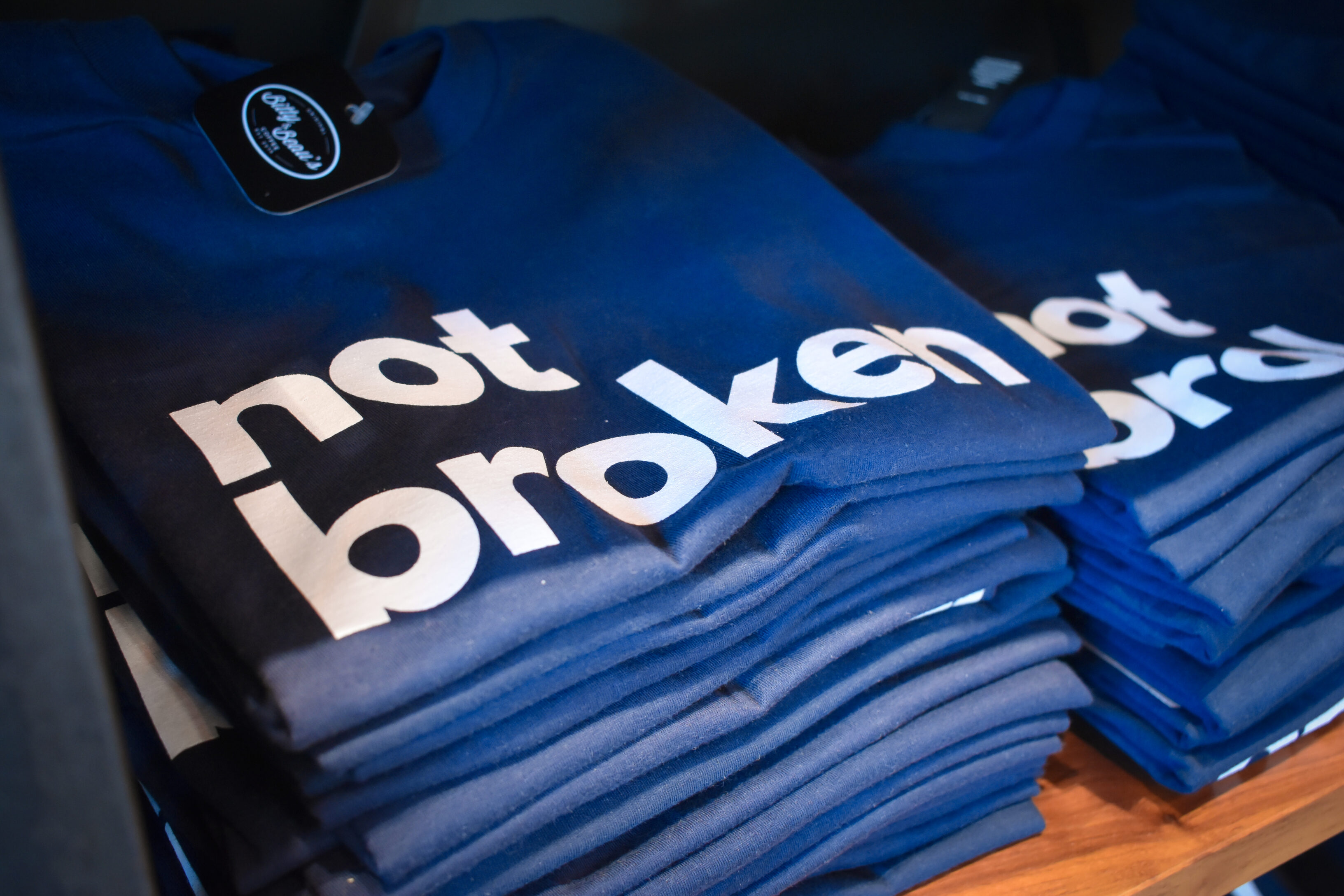
Bitty and Beau’s sells merchandise at their shops. They have shirts, mugs and their own coffee beans in store for sale. (Sharon Jo/B&W Staff)
During a time when many businesses struggle to recruit and retain employees, Bitty & Beau’s proves to be an exception.
Co-owner Kathi Eichman said the Bethlehem franchise received 90 registrants at its hiring fair in June of 2021.
The greater business community in Bethlehem has taken notice of Bitty & Beau’s distinctive hiring practices.
Eichman said the restaurant subcommittee for the Downtown Bethlehem Association invited Bitty & Beau’s to present at one of their meetings. The meeting was about ways to connect and engage individuals with disabilities with their hiring strategies.
“We were able to help them make community connections on how to tap into this viable, eager and underutilized part of the workforce,” Eichman said in an email.
Supervisor Creeden Kuritz said 10 months after opening, people still come in and inquire about potential job openings.
The flood of employee interest for the Bethlehem franchise comes as no surprise to Wright.
“People with disabilities want meaningful jobs, so when they are given the opportunity, they treasure that job, and they’re loyal and hardworking,” she said. “The attrition is next to zero.”
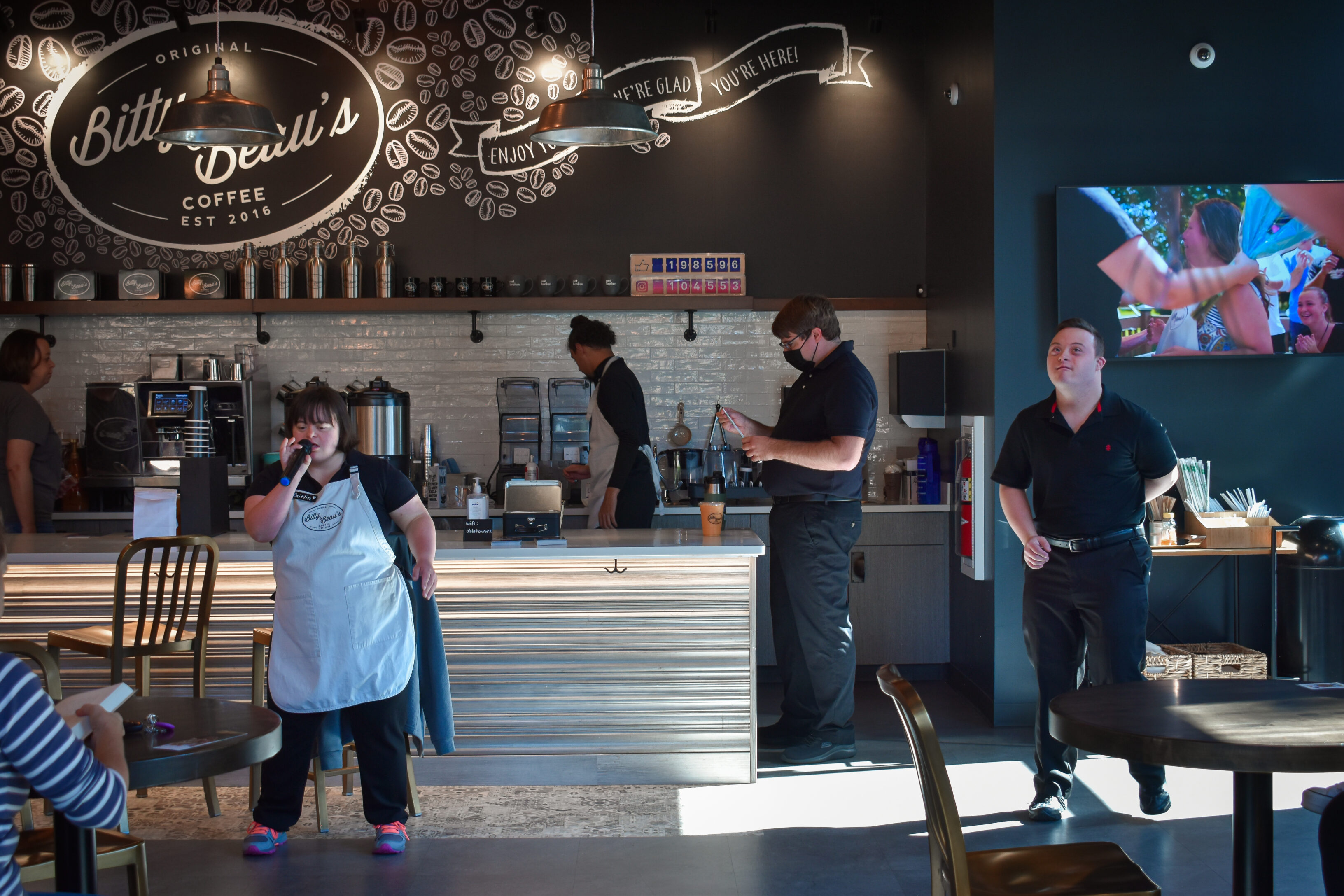
Employee Sean Maehrer dances along to his co-worker’s performance. Bitty and Beau’s employees often sing and dance when there are field trips at the shop. (Sharon Jo/B&W Staff)
Kuritz said she didn’t have experience working alongside individuals with disabilities until she joined Bitty & Beau’s. She now feels lucky to be a part of the team.
“It feels like I’m not even working, honestly,” Kurtiz said. “They all adapted to their jobs so fast, it amazes me.”
Wright said the shop helps their employees adjust to various roles as cashier, drink maker or card caller.
For example, after customers order, they receive a playing card from the cashier. The drink maker creates the order and hands it off to the card caller, who announces the number and suit of the card to indicate when a drink is ready.
Wright said the card calling technique sets the employees up for success and prevents misspellings of customers’ names on cups.
Emily Quist recently received a promotion from card caller to full-time cashier.
Quist said her favorite part about her role is interacting with customers.
“I like seeing all the people walk in,” she said. “I like their smiles. I like when they bring their kids here. I love it.”
Kuritz also enjoys greeting customers, especially when it’s their first time entering the shop.
“We can give them our spiel and then they’re like, ‘Oh that’s so cool,’” she said. “I love seeing their reactions and their faces because there’s nothing like this I know anywhere else in Pennsylvania.”
In addition to the shop’s newcomers, many local student groups and organizations come to Bitty & Beau’s for field trips.
Wright said she anticipates these visits will inspire students with disabilities to picture a future for themselves. For others, she hopes to familiarize people with a workforce where employees with disabilities are represented.
On these field trips, it’s common for Bitty & Beau’s employees to host dance parties and karaoke.
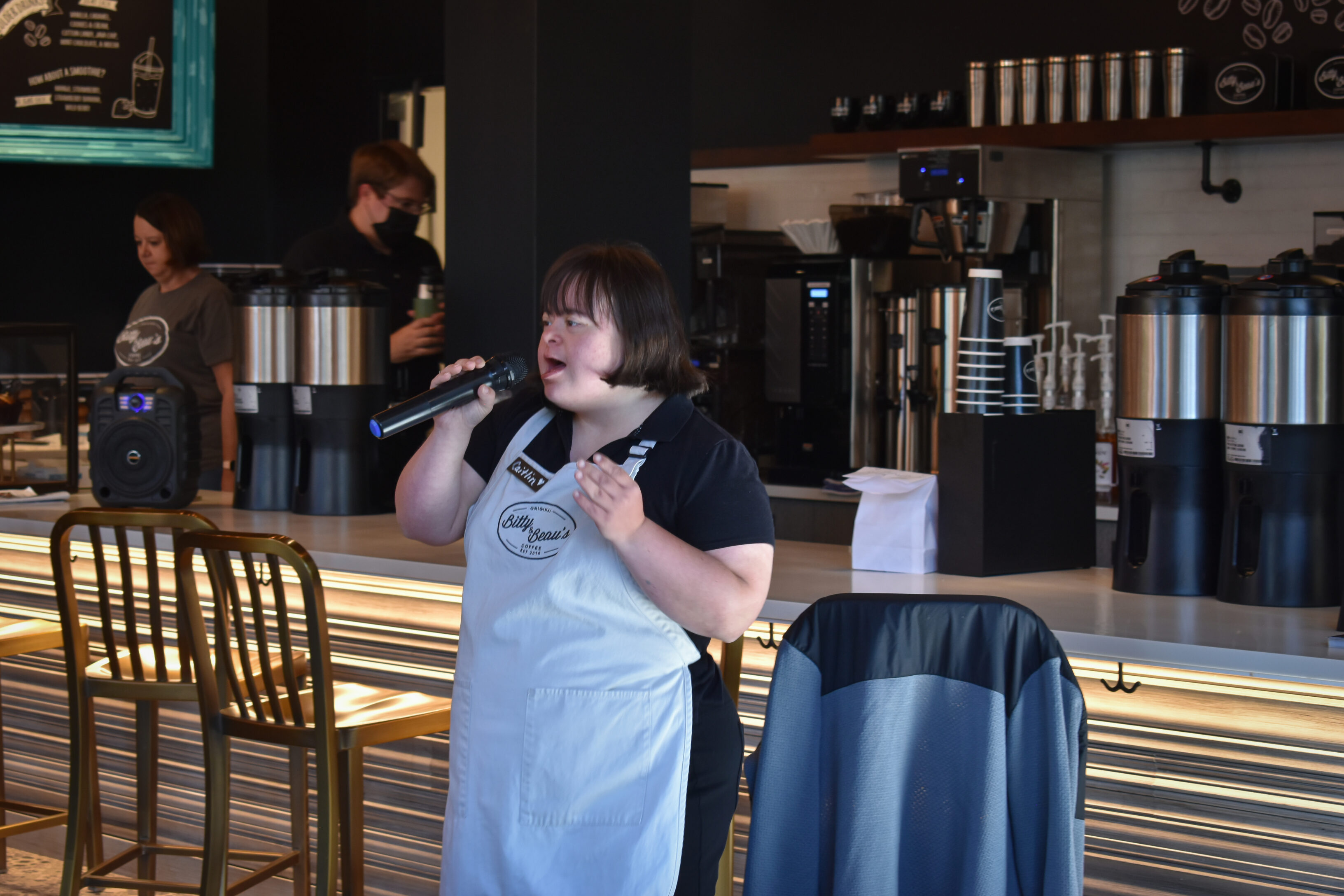
Employee Caitlin Polek sings karaoke to “We’re All In This Together.” She said her favorite movie is “High School Musical.” (Sharon Jo/BW Staff)
Diane Willans said though her son wouldn’t ordinarily dance in public, at Bitty & Beau’s, it’s part of his routine.
“He would never normally get up and dance,” she said. “He does all the time here.”
Diane Willans said her son also does custodial work at a nearby church, where he is usually on his own with limited human interaction.
She said the social piece of his additional job at Bitty & Beau’s has given him a greater sense of community.
“Since he came here, he’ll pick up any shift that’s open,” she said. “He has really opened up socially and just feels comfortable.”
Wright said she wants more businesses to become aware of the positive impact that hiring employees with disabilities can have and hopes Bethlehem will take note.
“There are businesses all over America right now that just need to think about their next hire a little bit differently,” Wright said. “I say, ‘Just give them a chance. You know, you really will be so pleasantly surprised.’”
Bitty & Beau’s slogan is “It’s more than a cup of coffee.” Diane Willans finds the tagline appropriate.
“I just come here, and I don’t want to go home,” she said. “I’m just like Kyle.”

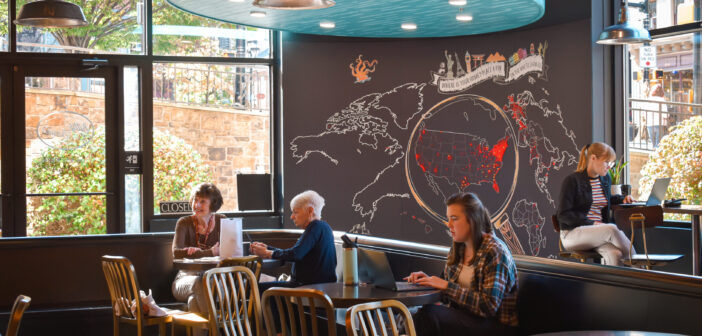




Comment policy
Comments posted to The Brown and White website are reviewed by a moderator before being approved. Incendiary speech or harassing language, including comments targeted at individuals, may be deemed unacceptable and not published. Spam and other soliciting will also be declined.
The Brown and White also reserves the right to not publish entirely anonymous comments.
1 Comment
“People with disabilities want meaningful jobs, so when they are given the opportunity, they treasure that job, and they’re loyal and hardworking,” she said. “The attrition is next to zero.” Could it be that people with disabilities know something many so called normal people don’t?